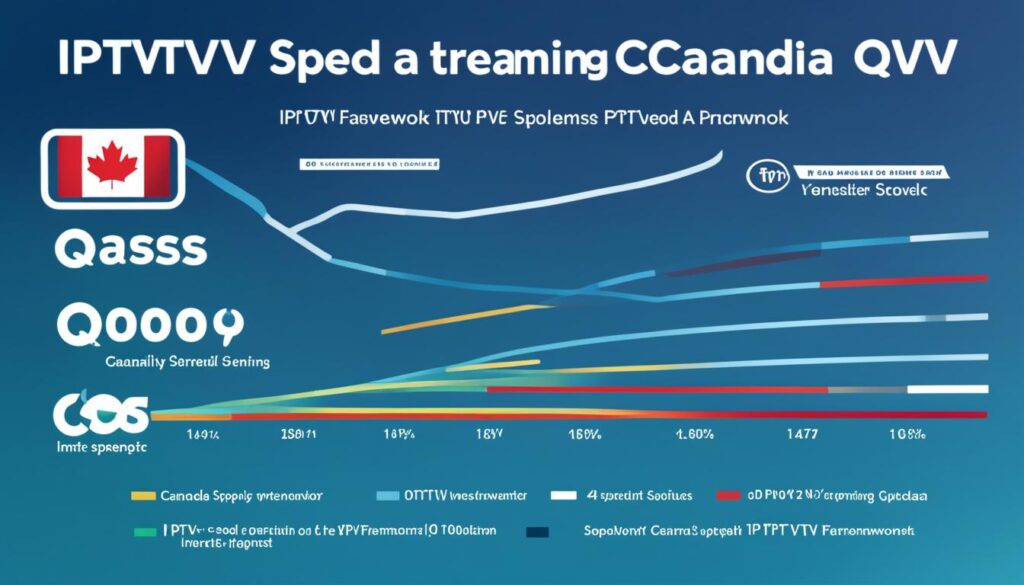The rise of Canada IPTV services has transformed the entertainment landscape, offering a plethora of viewing options at the tip of our fingers. Yet, the quality of this cutting-edge experience hinges on optimal connection speeds that support the weight of streaming data. As internet speed influences IPTV quality, it becomes clear that to achieve streaming reliability, one must ensure their network is up to par. At https://getmaxtv.com/, we’re committed to offering viewers the finest in home entertainment with the assurance of buffer-free enjoyment, provided your internet speeds meet the mark.
To immerse oneself in the high-definition world of online TV, knowing the nuts and bolts of your connection is paramount. Whether it’s binge-watching your favourite series or locking in for live sports, the last thing you want is interruption due to inadequate speeds. From standard definition’s bare minimum of 3 Mbps to the hefty 25 Mbps requirement for that crystal-clear 4K Ultra HD, each step up in video quality demands a corresponding leap in internet capability.
For a dependable and smooth streaming experience, troubleshooting starts with a robust setup. By testing your current speeds, utilizing the stability of a wired Ethernet connection, and securing your network properly, the goal of achieving flawless streaming is well within reach. Let’s dive into the essentials of internet requirements and uncover how to elevate your home entertainment to its peak performance.
Key Takeaways
- Ensuring a stable internet connection is vital for high-quality Canada IPTV services.
- Optimal connection speeds are crucial to avoid buffering and maintain streaming reliability.
- Internet speed influences IPTV quality, with higher resolutions requiring faster speeds.
- Testing internet speed is a practical step toward a buffer-free streaming experience.
- Secured and well-configured network settings contribute to uninterrupted IPTV enjoyment.
Understanding the IPTV Framework in Canada
As IPTV services continue to gain popularity across Canada, the IPTV streaming performance largely depends on a robust framework that addresses the specific bandwidth requirements and the intricacies of network latency measurement. Achieving seamless streaming is not just about the quantity of bandwidth but also the quality of connection and the efficiency of the home network setup.
For Canadian viewers, IPTV demands a stable and fast internet connection. Starting at a minimum of 10 Mbps for HD content, users should ensure their network can handle the streaming activity without lag. However, for the more demanding 4K streams, the bandwidth requirements jump substantially, necessitating at least 25 Mbps to enjoy the high definition content without any hiccups.

Network latency—an often underestimated factor—can significantly impact IPTV streaming performance. It is not solely about how fast data can travel, but also how quickly a network responds to requests. A lower latency strengthens the streaming experience by minimizing buffering and ensuring a smooth transmission of television content over internet protocols. Tools such as ping tests facilitate precise network latency measurements, enabling users to pinpoint and resolve potential delays within their network.
| Resolution | Minimum Bandwidth Required | Recommended Network Latency |
|---|---|---|
| Standard Definition (SD) | 5 Mbps | |
| High Definition (HD) | 10 Mbps | |
| 4K Ultra HD | 25 Mbps |
Addressing home network infrastructure is equally critical for enhancing IPTV streaming. Incorporating a dual-band router with MU-MIMO technology is advisable, ensuring multiple devices can connect and stream effectively sans the interference associated with a single frequency band. In-depth knowledge of Wi-Fi frequencies is beneficial here, with a 5 GHz frequency band offering faster data transfer, which is particularly beneficial for IPTV streaming.
By understanding the IPTV streaming requirements and addressing the inherent bandwidth and latency needs, Canadians can set up their home networks for optimal television viewing experiences. Keep in mind that a meticulous network setup, along with choosing the right ISPs and equipment, are definitive steps towards enjoying uninterrupted entertainment through IPTV services available at https://getmaxtv.com/.
Internet Connectivity: The Backbone of Streaming
The digital age has made IPTV box network connectivity an essential element for streaming content across Canada, weaving a network that connects audiences to a world of entertainment at the click of a button. It’s a pivotal component that requires robust management and understanding to guarantee that viewers enjoy a seamless and uninterrupted experience.
Why Your Connection Speed Matters for IPTV
When it comes to IPTV, every second of delay or hitch in connectivity can significantly mar your streaming experience. Ensuring that your IPTV box is connected to a stable and fast internet connection is paramount. Not only does it enable you to enjoy streaming content without the dreaded buffer symbol, but it also allows for higher quality viewing, such as HD and 4K UHD streams, which demand greater bandwidth.
Speed is the crux of the issue; without it, your quests to resolve connectivity problems might be in vain. A slow connection interrupts the constant flow of data to your IPTV box, causing freezes and quality drops—problems that no viewer should have to endure.
Assessing Internet Speeds in Different Regions of Canada
Canada’s vast expanse presents a unique challenge in maintaining consistent internet speeds across provinces and territories. While urban areas may boast higher speeds due to better infrastructural support, rural areas could struggle with consistency. This disparity can play a significant role in the performance of your IPTV box and, by extension, your streaming experience.
To emphasize the variance in regional connectivity, consider the table below, which highlights the differences in average internet speeds across different parts of Canada:
| Region | Standard Definition (3-5 Mbps) | High Definition (5-10 Mbps) | Ultra High Definition (25+ Mbps) |
|---|---|---|---|
| Atlantic Provinces | ✔️ | ✔️ | ✖️ |
| Quebec | ✔️ | ✔️ | ✔️ |
| Ontario | ✔️ | ✔️ | ✔️ |
| Prairie Provinces | ✔️ | ✔️ | ✔️ |
| British Columbia | ✔️ | ✔️ | ✔️ |
| Northern Territories | ✔️ | ✖️ | ✖️ |
Testing your internet speed is a crucial step in resolving connectivity problems, whether you live in a bustling city or a remote area. Adequate speed ensures the content delivered to your IPTV box is steady and of the quality you desire. To achieve this, conducting multiple speed tests at different times of the day provides a more accurate assessment of your connection reliability.
Optimizing Your Network for Enhanced IPTV Performance
To unlock the full potential of IPTV streaming, network optimization is key. With the increasing demand for high-definition content, your home network must be robust enough to handle consistent data flow without hiccups. In this pursuit of seamless streaming, we’ll guide you through selecting an appropriate router and setting up your connection for optimum performance.
Selecting the Right Router for Superior Streaming
When considering a router upgrade for enhanced IPTV streaming, look for models that promise to boost your Wi-Fi signal strength. Features such as dual-band support and Quality of Service (QoS) settings play a crucial role in managing your network’s bandwidth. A strong signal is paramount for high-definition video without interruption, and the right router sets the stage for a flawless IPTV experience.
Modern routers with advanced QoS can prioritize your IPTV traffic, ensuring that streaming content gets the bandwidth it needs even when your network is under heavy use. In essence, a high-quality router will adapt to the unique requirements of IPTV, maintaining the integrity of your viewing pleasure.
Wired vs. Wireless: Best Practices for Reliable IPTV Connections
While the convenience of wireless connections is undeniable, using Ethernet for IPTV streaming provides the pinnacle of reliability. A direct cable connection from your IPTV device to your router ensures stable speeds and smooth playback, especially for 4K UHD content where every bit counts. Consider running Ethernet cables to your primary streaming devices to eliminate the majority of wireless interference, leading to a robust and consistent IPTV performance.
For homes where running cables is not feasible, powerline adapters offer a compelling alternative. These devices use your home’s electrical wiring to create a stable network connection, nearly mirroring the reliability of an Ethernet connection. They are an especially beneficial solution for those who wish to maintain a tidy living space without the clutter of cables.

In conclusion, investing time in network optimization and upgrading your hardware is a necessary step towards a buffer-free IPTV experience. Whether you choose a cutting-edge wireless router or opt for the unmatched stability of an Ethernet connection, these enhancements will surely elevate your IPTV streaming quality.
Canada IPTV Services and Required Internet Performance
For an enhanced viewing experience with IPTV services, addressing buffering issues is paramount. These disruptions in your streaming joy are not simply annoyances, but symptoms of underlying challenges with your internet connection. Achieving a stable internet connection with sufficient speed plays a critical role in acquiring smooth, interruption-free entertainment through your IPTV device.

To maintain optimal IPTV device performance, one should consider the kind of content they are streaming. With different quality demands ranging from standard definition to ultra-high definition, your internet speed requirements will vary significantly:
| Content Quality | Minimum Internet Speed |
|---|---|
| Standard Definition (SD) | 10 Mbps |
| High Definition (HD) | 25 Mbps |
| 4K Ultra HD | 50 Mbps |
Often, households streaming across multiple devices can run into network congestion, leading to aggravating buffering issues. A solution to this can be found in your router’s Quality of Service (QoS) settings, allowing priority traffic to your IPTV services and ensuring continued enjoyment without disruption.
Lastly, to make sure your IPTV device performance stays top-notch, regularly check for software updates and ensure your hardware meets the minimum requirements set by your service provider. Visit https://getmaxtv.com/ for further insights on how to enhance your IPTV experience in Canada.
Maximizing Quality: Adjusting Settings for Optimal IPTV Experience
Ensuring a premium IPTV experience goes beyond having a fast internet connection. To truly elevate your streaming, specific settings within your hardware and network must be fine-tuned. Quality of Service adjustments, routine maintenance of your IPTV box, and meticulous IPTV traffic prioritization play pivotal roles in delivering high-quality video streaming.

Fine-Tuning Your IPTV Box Settings
It’s important to regularly check your IPTV box for software updates that can enhance performance and introduce new functionality. Ensuring that you are running the latest firmware is essential for security and reliability. Beyond updates, customizing the box’s streaming settings can also make a notable impact on the streaming quality. Consider the video resolution and bitrate that your internet connection can handle smoothly and adjust your settings accordingly. These preparatory steps are often overlooked yet are crucial for maintaining uninterrupted and high-quality video streaming.
Network Tweaks to Accommodate Higher Video Quality
On your network, implementing Quality of Service adjustments can make a substantial difference. For viewers who demand the finest visual experience, it is beneficial to allocate bandwidth efficiently to prioritize IPTV traffic. This ensures that streaming services receive the necessary bandwidth, even during peak network usage. Take advantage of your router’s capabilities by setting up rules that give streaming traffic precedence over other usages, thus sustaining superior video quality even during data-heavy periods.
By responsibly managing your network and devices, you can help secure a seamless entertainment experience. For more tips and detailed information on optimizing your IPTV service, visit our website https://getmaxtv.com/.
Conclusion
In summing up, achieving an optimal IPTV experience in the Canadian landscape involves a keen understanding of how internet speed and comprehensive network management directly contribute to uninterrupted entertainment. Being aware of the necessary internet speeds for various content resolutions—whether it’s standard definition or the crisp clarity of 4K Ultra HD—becomes integral to circumventing the pitfalls of low-quality streaming that plague many viewers.
Our deep dive into network configurations underscores the importance of fine-tuning your settings. By making informed choices about your ISP plan, selecting a robust router, and strengthening Wi-Fi signals, you position yourself to enjoy high-quality streaming that drastically minimizes disruptions. This systematic approach to optimizing all components within your home network is vital in elevating your IPTV service to its highest capability.
To support you in this endeavor, our website, https://getmaxtv.com/, provides the tools and guidance necessary to streamline your setup for premium IPTV satisfaction. Take control of your viewing experience, elevate your configurations, and rest assured that with the right setup, engaging, high-fidelity IPTV content is well within reach for your home entertainment system.
FAQ
How does internet speed influence IPTV quality in Canada?
Internet speed directly impacts streaming reliability and quality of IPTV services. Lower speeds can result in buffering, poor video quality, and frequent disruptions, whereas optimal connection speeds ensure smooth and high-quality streaming experiences.
What are the bandwidth requirements for IPTV streaming performance?
The bandwidth requirements for IPTV streaming vary depending on the content resolution. Standard Definition (SD) content typically requires at least 3-5 Mbps, High Definition (HD) content requires 10-15 Mbps, and 4K Ultra HD content needs at least 25 Mbps for optimal performance.
How can I measure network latency affecting IPTV in Canada?
Network latency can be measured using online tools that perform ping tests. These tests help analyze and improve network response times, which is crucial for maintaining a high-quality IPTV streaming experience.
Why does my connection speed matter for IPTV?
Your connection speed is vital for IPTV because it determines your ability to stream content without interruptions. The IPTV box needs to consistently receive data at a fast enough rate to prevent buffering and provide a seamless viewing experience.
How do internet speeds differ in various regions of Canada, and how does that affect IPTV?
Internet speeds in Canada can vary significantly based on location and infrastructure. Rural areas might have slower speeds compared to urban centers, which can lead to less reliable streaming and increased buffering. Assessing and understanding these speeds are crucial for resolving connectivity problems and optimizing the IPTV experience.
What router features should I look for to enhance my IPTV streaming experience?
Choose a router with strong signal strength, dual-band support, and advanced features like Quality of Service (QoS) to manage your network’s traffic. Routers that support technologies such as MU-MIMO can also enhance device performance by allowing multiple devices to stream simultaneously without loss of quality.
Is it better to use a wired or wireless connection for IPTV streaming?
A wired Ethernet connection is typically more reliable and stable for IPTV streaming, especially when dealing with high-bandwidth content like 4K UHD. Wireless connections can also be effective, particularly if you have a strong Wi-Fi signal and a modern router, but they are generally more prone to interference and fluctuations in speed.
What causes buffering issues and how can they be prevented during IPTV streaming?
Buffering issues are usually caused by a slow or unstable internet connection. To prevent buffering, ensure you have a stable internet connection that meets the minimum speed requirements for the content you’re trying to stream. Upgrading your internet plan, optimizing your network settings, and reducing network congestion can also help.
How can I fine-tune my IPTV box settings for a better streaming experience?
Fine-tuning your IPTV box settings can involve updating the device firmware, closing unnecessary background applications, adjusting the streaming quality to match your internet speed, and ensuring your device’s capabilities align with the service requirements.
What network tweaks can I make to handle higher video quality?
To handle higher video quality, consider implementing QoS adjustments on your router to prioritize IPTV traffic, setting up bandwidth limits for other types of traffic, and using network management features that ensure smooth video streaming even when multiple devices are connected.
Source Links
- https://medium.com/@iptv-provide.com/improving-your-home-network-for-buffer-free-iptv-streaming-in-2023-b256f2d8e903
- https://medium.com/@hamidsa275/internet-speed-requirements-for-iptv-1a62932c3ff0
- https://baltimorecitypolicedept.org/what-internet-speed-do-you-need-to-use-an-iptv-service-without-buffering-issues/



